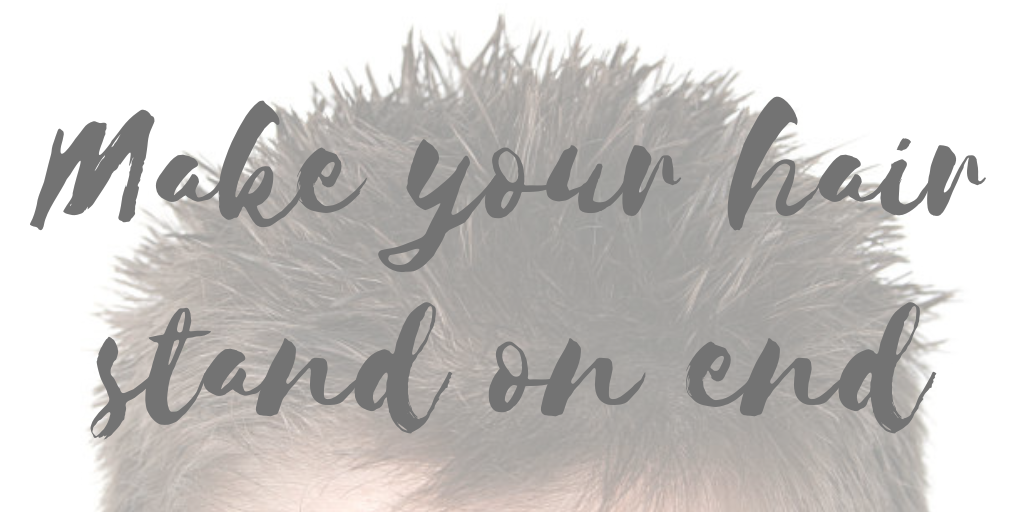The idiom “make your hair stand on end” is used to describe something that is so frightening or shocking that it causes a person’s hair to stand on end. On the literal level it is a physical reaction that is caused by the release of adrenaline, which is a hormone that is associated with fear and anxiety. When adrenaline is released, it causes the blood vessels to constrict, which can lead to goosebumps and the hair standing on end. But the idiom “make your hair stand on end” is usually used in a more figurative sense. For example, someone might say that a piece of music “makes their hair stand on end” if it is very moving or beautiful. In this case, the idiom is not being used to describe a physical reaction, but rather an emotional one.
Origin of “make your hair stand on end.”
The origin is unknown. One theory is that the idiom is related to the belief that hair is a source of power. In many cultures, hair is seen as a symbol of strength, vitality, and even magic. It is possible that the idea of “making your hair stand on end” came to be associated with the idea of being scared because it is a way of saying that you are so scared that your hair is literally standing on end.
The Shakespeare connection
The idiom “make your hair stand on end” is a powerful and evocative phrase that Shakespeare uses to create a sense of fear and suspense in his plays. The phrase is a reminder that even the most powerful and courageous people can be overcome by fear.
The idiom “make your hair stand on end” appears in Shakespeare’s play Hamlet, for example, the character Hamlet says “My hair stands on end, my heart within me dies,” when he sees the ghost of his father. He is describing terror and shock feeling of terror or shock he feels at the sight.
In Macbeth, the phrase is used to describe the witches. When Macbeth first meets the witches, he is so shocked by their appearance that his hair stands on end. He says:
“What, these are the usurpers?
It is my soul that speaks,
It is myself that feels it.
My hair stands on end,
My blood runs cold,
My heart beats wildly.”
In King Lear, the phrase is used to describe the storm that rages during the play. When Lear is caught in the storm, he is so terrified that his hair stands on end. He says, “The winds are howling, / The rain is pouring, / The thunder is crashing, / The lightning is flashing, / And my hair stands on end.”
In addition to the plays mentioned above, the idiom “make your hair stand on end” also appears in Shakespeare’s sonnets. In Sonnet 148, Shakespeare uses the phrase to describe the power of love. He says, “Love is too young to know what conscience is, / Yet old enough to make my hair stand on end.”
“Make your hair stand on end” in other literature and popular culture
The idiom “make your hair stand on end” has a long history, dating back to at least the 16th century. The earliest recorded use of the phrase is in a poem by John Lyly, published in 1589. In the poem, Lyly describes a scene of battle, and he says that the sight of the carnage “made the haire of the boldest stand on end.”
The idiom “make your hair stand on end” has been used in literature ever since. In the novel “Frankenstein” by Mary Shelley, the monster tells the story of his creation, and he says that the sight of his own reflection “made my hair stand on end.” In the novel “The Turn of the Screw” by Henry James, the governess tells the story of two young children who are haunted by ghosts, and she says that the sight of the ghosts “made my hair stand on end.”
The idiom “make your hair stand on end” has also been used in the media and in popular culture. In the movie “The Exorcist,” the possessed girl’s hair stands on end as she levitates above her bed. In the movie “The Shining,” the ghosts of the Overlook Hotel make the hair on the characters’ heads stand on end. In the television show “The X-Files,” the agents often investigate cases that are so strange and disturbing that they make their hair stand on end.
In the media too: In the news coverage of the 9/11 terrorist attacks, many people described how their hair stood on end as they watched the events unfold. The movie “The Exorcist” is often described by critics as a movie that will make your hair stand on end. The video game “Resident Evil” is often described as a game that will make your hair stand on end.

Make your hair stand on end…
Using “make your hair stand on end”
Here are some examples of how the idiom “make your hair stand on end” can be used in a sentence:
- The sight of the ghost made my hair stand on end.
- The story he told was so scary it made my hair stand on end.
- The music was so beautiful it made my hair stand on end.
- The experience was so intense it made my hair stand on end.
- The sunset made my hair stand on end.
In conclusion
The idiom “make your hair stand on end” is a powerful and evocative expression that can be used to describe a wide range of experiences, from fear and shock to awe and wonder. The phrase is a reminder of the power of the human imagination, and it can be used to create a sense of suspense, horror, or excitement in a story or a film.




Leave a Reply
Want to join the discussion?Feel free to contribute!